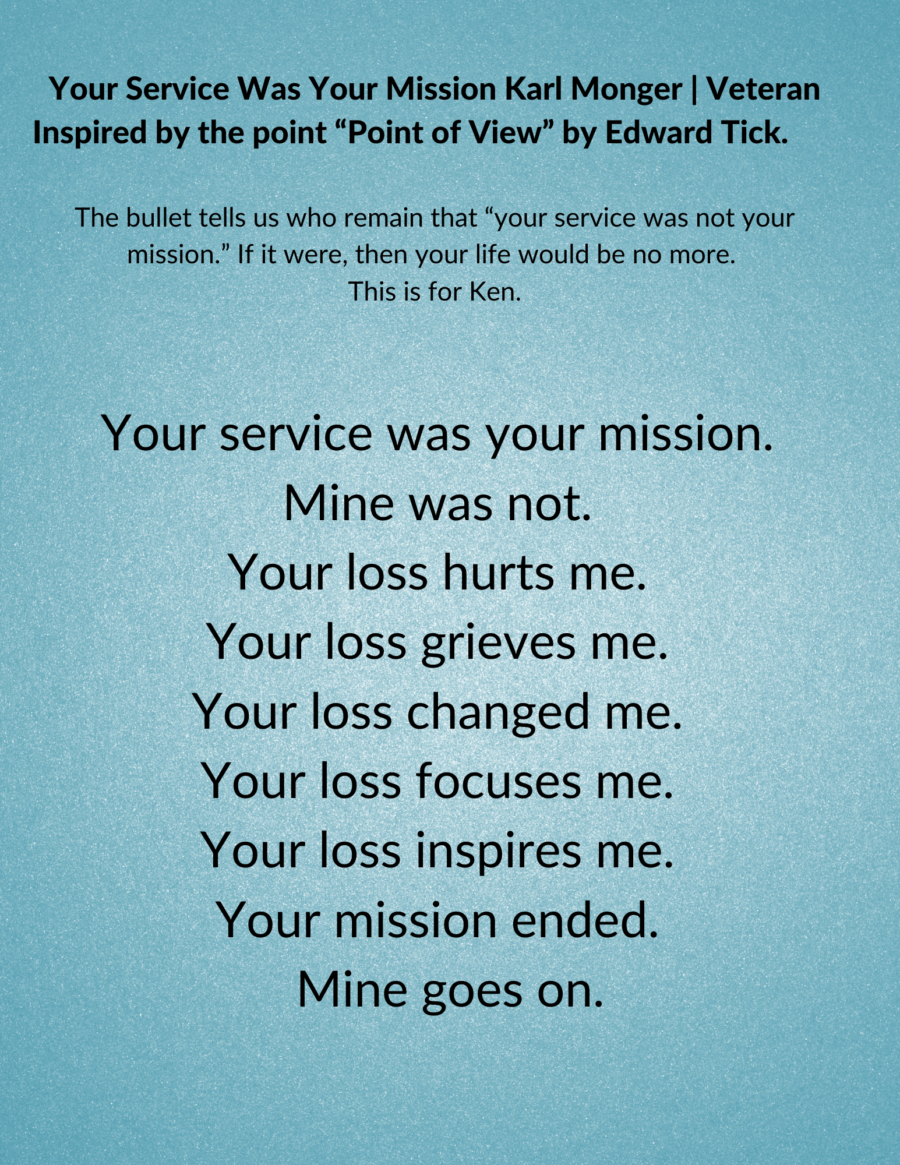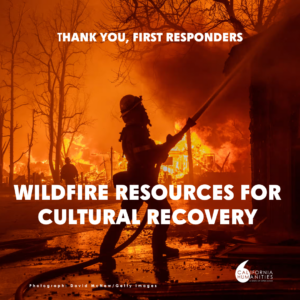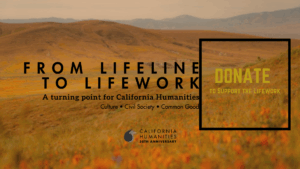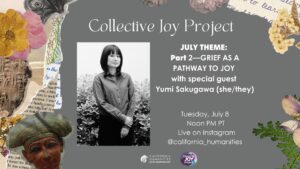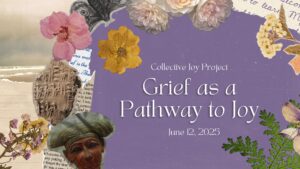“We cannot stress strongly enough how vital the humanities are in warrior and trauma healing. Since the beginning of time, warriors have used the humanities to tell their stories and heal.” — Cheryl Montelle, Executive Director of the Mil-Tree Veteran Project
This post highlights Art of Resilience; a California Humanities-supported project working with veterans. Cheryl Montelle, the Executive Director of the Mil-Tree Veteran Project, recently presented the Art of Resilience, a three-day virtual retreat and poetry anthology organized to bring together veterans transitioning from military to civilian life with other community members. The project was led by four experienced facilitators who used a transformative approach that blended creative writing, artmaking, discussion, and talks with earth-based rituals. Participants had the opportunity to create their own sacred space and create altars to beauty and grief, to share their stories through dialogue, writing, and performative arts (e.g., vocalization, physical movement, and storytelling) within a held and safe space.
How did you become involved in working with veterans? What insights have you gained working with this population?
I read Dr. Ed Tick’s book War and The Soul: Healing Our Nation’s Veterans from Post-Traumatic Stress Disorder, and I was very moved. I was inspired enough to ask him if he would do a book reading in Joshua Tree, CA. The stars aligned as he was coming to California and stopped in Joshua Tree. Dr. Tick held a book reading and a community meeting, encouraging us to start a community group to support veterans. I contacted my mailing list, some showed, and we came up with a name and organized to become a 501(c)3. This was in 2012.
Soon after, in 2013, we hosted a Soldiers Heart Retreat (Dr. Tick and his wife, Kate Dahlstedt’s non-profit program serving veterans). Our retreat helped civilians learn how to best support veterans and was attended by veterans, active duty, family members, therapists, healers, a veteran from a gang, a conscientious observer, and concerned community members like me. I knew very little about veterans, their experiences, and struggles, so it was eye-opening to learn more about what it’s like to serve. At this point, I know that veterans are an underserved community. There can be all kinds of trauma related to serving and trauma before serving, enhancing the negative experiences of active duty. Often there is the feeling of isolation and guilt when back home, especially when they made it home and a buddy didn’t, or from actions they took or witnessed that were immoral. I also have learned that most of the men and women who entered service did so from a sense of duty and pride. Each veteran I have met is unique with their own set of accomplishments and wounds, whether the wounds they carry are emotional, physical, or both.
From 2013 to date, we have produced a variety of different events and programming, from building structures, hosting many art workshops and spoken word events, rock climbing, readings, and transformative retreats, to name a few. We always include active duty and civilians into our programming because we want the veterans and active duty to experience the civilian community’s support. Our mission is to bring them all together through arts and dialogue to help transform war wounds. We want our warriors to know that there is a path home and a community to come home to.
Tell us about your experience working on this project during the COVID-19 pandemic. How was this project adapted from an in-person experience to a virtual program?
Once we realized our two grants (a Humanities for All Quick Grant being one of them) would support going virtual, and not knowing how long COVID-19 was going to last, we took advantage of the opportunity to move forward online so that we could offer the Art of Resilience in such a time of need. Initially (and hopefully in the future), we were to meet at The Joshua Tree Retreat Center where veterans and civilians would attend the retreat, eat and sleep on campus, with the ability to get to know each other and ultimately create new bonds of friendship and support. We quickly switched to the Zoom platform and created an agenda that had a constructive and creative flow with various events and enough breaks to be online for several hours. Each person in their own home created their own sacred space, including a threshold into that space and an altar to beauty and grief. These rituals, usually done together, were improvised to perform at home to create a safety field that was carried right over the internet.
We discovered that it is indeed very possible to create a safe, intimate, and sacred space using the online platform. We worked on increasing the sense of intimacy, belonging, and inclusion. We encouraged and used song, chanting, movement, so screen time was reduced, and comfort was achieved. We taught other forms of intimacy over distances, encouraging participants to watch facial expressions and body movements for communication. This online retreat also allowed participation for some that might not have been able to attend in person. It also allowed for a more comfortable experience because participants did not have to travel. They could sleep in their own beds and enjoy the safety of their home spaces. We found that a distant retreat could be extraordinarily intimate and effective and plan to continue developing this online venue. As mentioned, we incorporated rituals, lectures, discussions in small groups, writing exercises, and public performances for those who wished to share their writings.
Along with the group, we invited friends, family, and community onto the Zoom space to bear witness and hold space, and it was a heartfelt performance and gathering. The participants were fully engaged all three days. We did create a safe space to explore, create, and share. There was a cohesive sense of connection where friendships and support were established. Follow up evaluations affirmed that this was a very positive, healing, and growth-producing experience for all who attended.
Given the diverse populations of veterans who took part in this project, how can the humanities help civilians understand veterans’ complex experiences? In turn, what kind of healing or self-reflection has an exploration of the humanities provided for the veterans who took part in this project?
When Mil-Tree does a program or event, we always like to include civilians to support and hold space for our returning military men and women. Both aspects are essential for the civilian, be it family member, health care provider, or concerned community member, to better understand and appreciate the experiences and/or trauma our veterans come home with. Then they can begin actually to support the vets in a more significant way. Our goal is to provide programming for veterans and active military in a safe environment where they can begin to take off their armor and participate in activities within the greater community, whether it is building something, expressing thoughts and feelings through the arts, or relating their experiences through heart-to-heart dialogue. When we really listen to each other, listen to each other’s stories, we not only begin to understand the other person, but we learn more about ourselves as well.
We cannot stress strongly enough how vital the humanities are in warrior and trauma healing. Since the beginning of time, warriors have used the humanities to tell their stories and heal. The very first poem we have, the Epic of Gilgamesh, is a warrior epic from 5,000 years ago. We follow this inspiration and use the humanities to bring our warriors wisdom, healing, and homecoming.
Dr. Tick’s approach is unique. We have adopted it in Mil-Tree to study, teach, present and utilize teachings, practices, and materials from the worldwide humanities traditions that support and speak to warrior-hood. We utilize poetry, mythology, and literature through the ages related to warriors and warfare. We use creative writing exercises, including readings and sharing throughout the retreats. We utilize teachings, rituals, and practices such as drumming, altar-building, guided imagery, visualizations, tales from other warrior cultures throughout our retreat to demonstrate the warrior’s journey through life and guide and encourage our warriors on this healing path home. We affirm that psychology without the humanities is empty of spirit, and including the humanities as essential brings hope, guidance, wisdom, and spiritual restoration to our warriors.
The Art of Resilience Retreat is supported by a Humanities for All Quick Grant. To learn more about this project, visit mil-tree.org.

